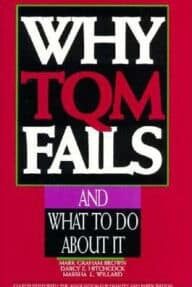Some of you reading this might remember the Total Quality Management (TQM) movement of the late 1980s and 1990s. Many would look back and label it a “fad.” As I've said about Lean, it's only a fad to those who are susceptible to fads. As I blogged about in 2006, management is often prone to jumping from fad to fad.
Many organizations have moved on from TQM (after labeling it a “failure?), many of them then getting into Lean. As I've written about, the organizations I've visited in Japan seem to have layered Lean methods ON TOP of the foundation of 20 year TQM efforts.
Here in 2016, we're often talking and writing about so-called “Lean failures” or “L.A.M.E.” initiatives that bastardize Lean and miss the point completely. One can argue Lean doesn't succeed or fail… just like TQM didn't succeed or fail… people and organizations succeed or fail. Lean has been proven to work… but that doesn't mean it always does. Same was true with TQM.
The 1994 book Why TQM Fails And What to Do About It is a book that could be very relevant today, in the context of Lean. I'll give credit to Greg Jacobson, MD from KaiNexus who had a copy of this book on his shelf. I bought a copy and have recently been reading it because I was curious to see if there parallels to be found with Lean failures.
The book's description says:
“Total Quality Management (TQM) was once touted as the management approach that would revitalize American business. Now: faced with meager improvements & deleted budgets, managers are wondering, what happened?” Why TQM Fails & What to Do About It? is a trouble-shooting guide for all areas of quality management. You'll understand the most common mistakes organizations make during start-up alignment, & integration, & learn the actions your organization can take immediately to avoid these failures-& reap the intended rewards of quality improvement. Whether your organization is in the midst of a TQM crisis or just wants to avoid disappointing results, this pioneering reference reveals how to increase the probability of success & gain genuine, enduring support from executives, managers, & workers.”
Maybe TQM was oversold. Maybe consultants and those who embraced TQM overestimated the ability of executives to change their approach and to leave old management habits behind? I was lucky to learn about TQM, Deming, and Lean during the early and formative years of my career… it's much more difficult for somebody with 30 years of experience to unlearn what they've done in the past… those things that have made them successful as individuals (even if their organizations are struggling).
Here are some excerpts from the first few chapters (click on any image for a larger view):
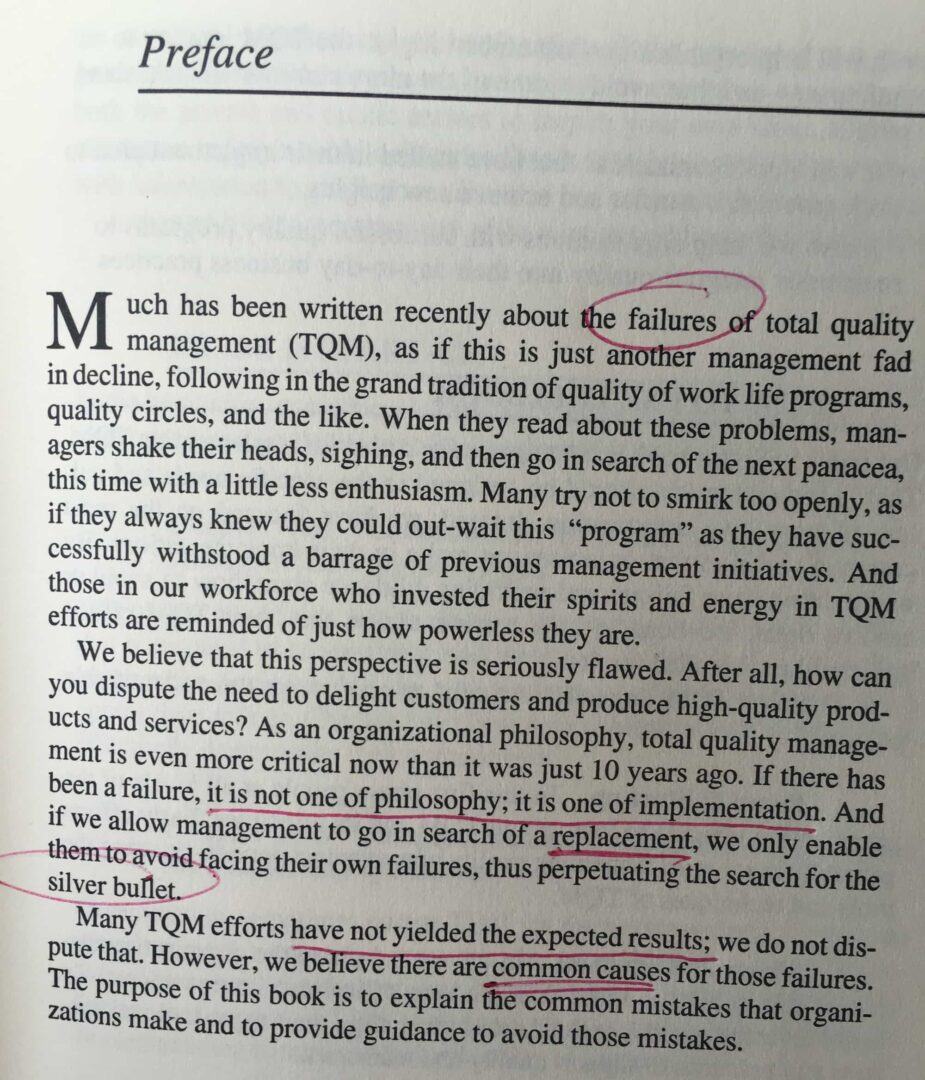
The authors say there's not a problem with the TQM philosophy, just with its implementation. Many (not all) TQM efforts “have not yielded the expected results,” so why? “Why?” is a good question for a Lean thinker to ask, in general.
Hear Mark read this post — subscribe to Lean Blog Audio
Sometimes, TQM was doomed to failure at the start if there isn't a compelling “Why TQM?” case:
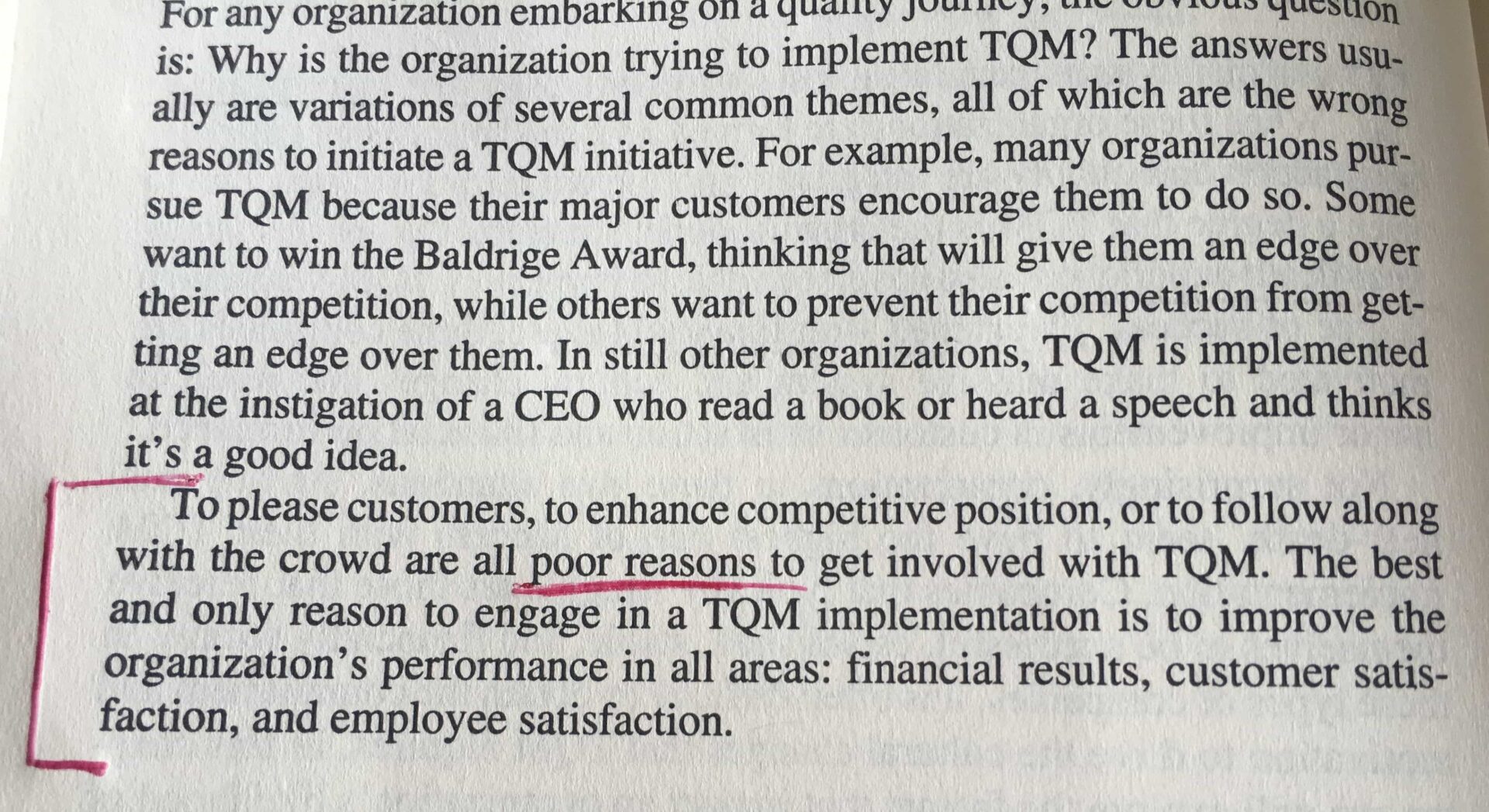
I've long said that “because Lean is trendy” is just about the worst reason for a hospital to try to embrace Lean. This often leads to superficial efforts. Many auto suppliers and other manufacturers basically went along with TQM or Lean because a customer told them too. For different reasons, many would rather say they're doing Lean or look like they're “implementing Lean” instead of really embracing it.
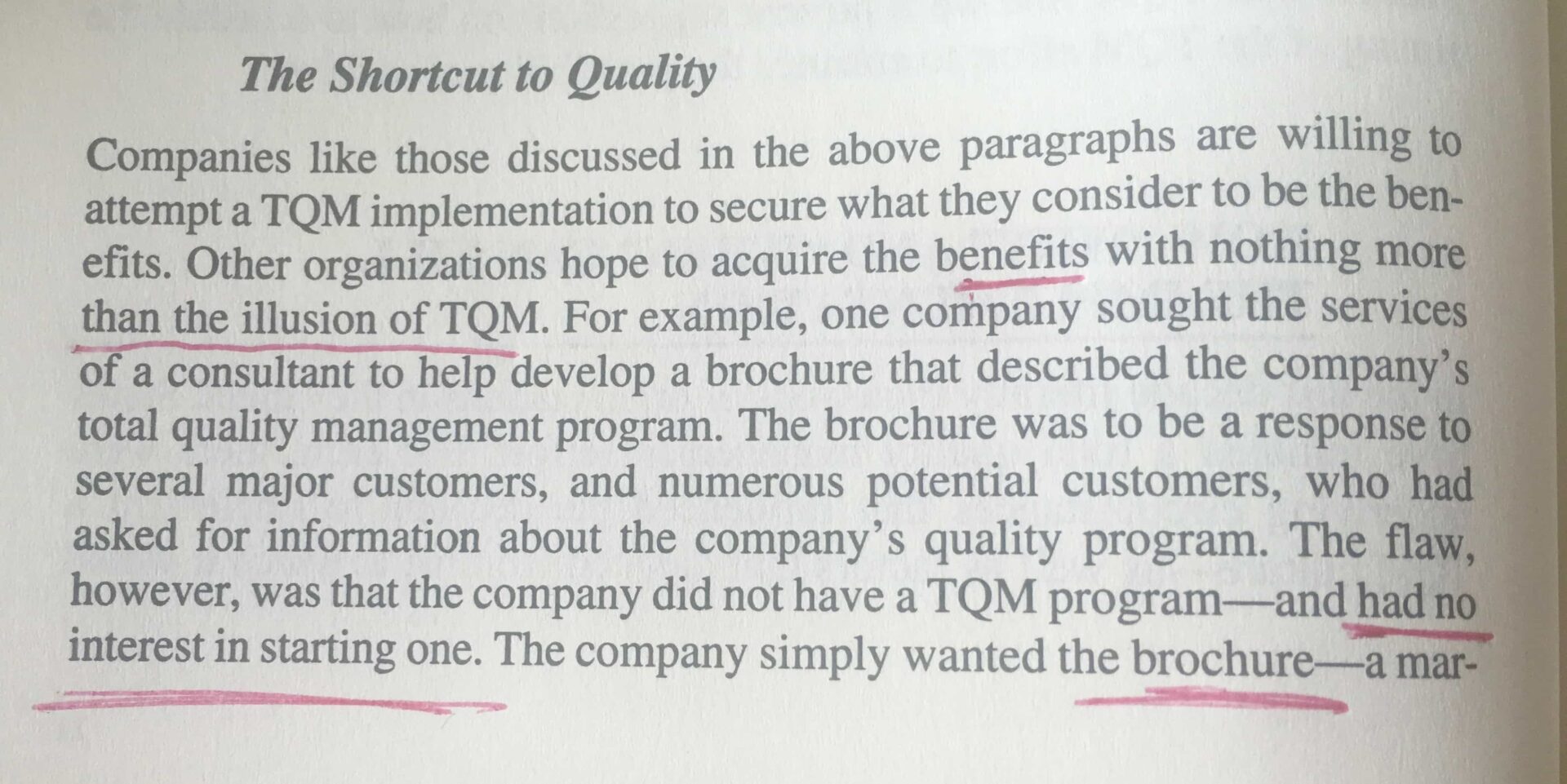
There are no shortcuts to quality, just as there are no shortcuts to Lean. How many are just pursuing the “illusion of Lean?”
Sadly, I've seen many organizations put statements on websites or waiting room walls that SOUND good… such as their goal of being a culture of continuous improvement (when there are often no legitimate efforts being made to get there).
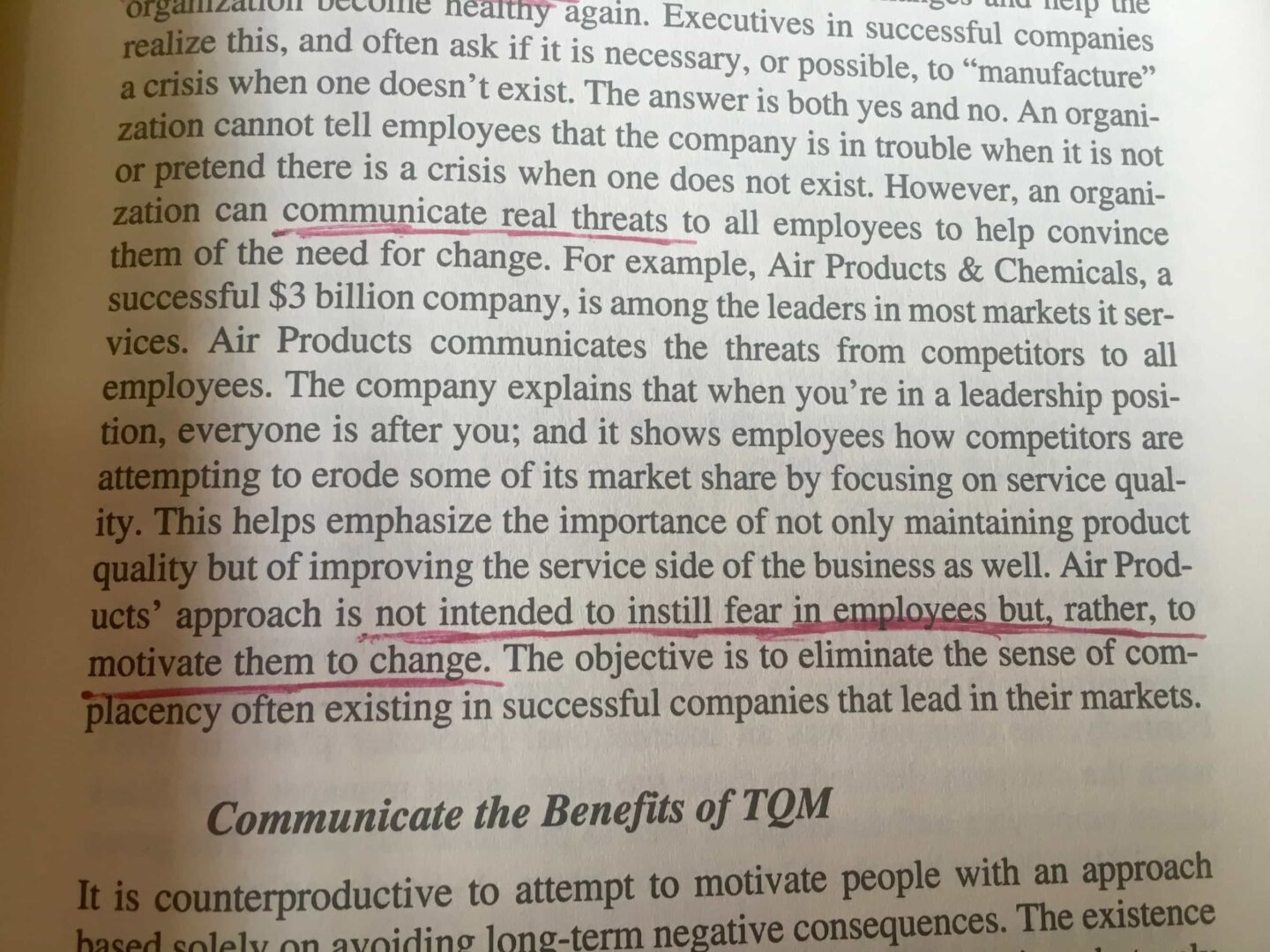
The authors talk about the case for TQM. Yes, executives can communicate the real reality of threats to the organization. I'd rather have executives be honest and work together with people instead of hiding problems from employees in a paternalistic or maternalistic sense.
It can be helpful to have a “burning platform” but we have to be careful not to just stoke the flames of fear. Fear can cause people to become paralyzed instead of inspiring change (something we talk about and work through in my change management simulation workshop, by the way). It can be helpful to talk about threats, but we also need to have a plan for addressing those threats — whether that was TQM or Lean. Or, we can try the positive approach of communicating the expected benefits of TQM or Lean.
This final excerpts includes some of the other reasons for TQM failure or underperformance… and I've seen these all in the context of Lean.
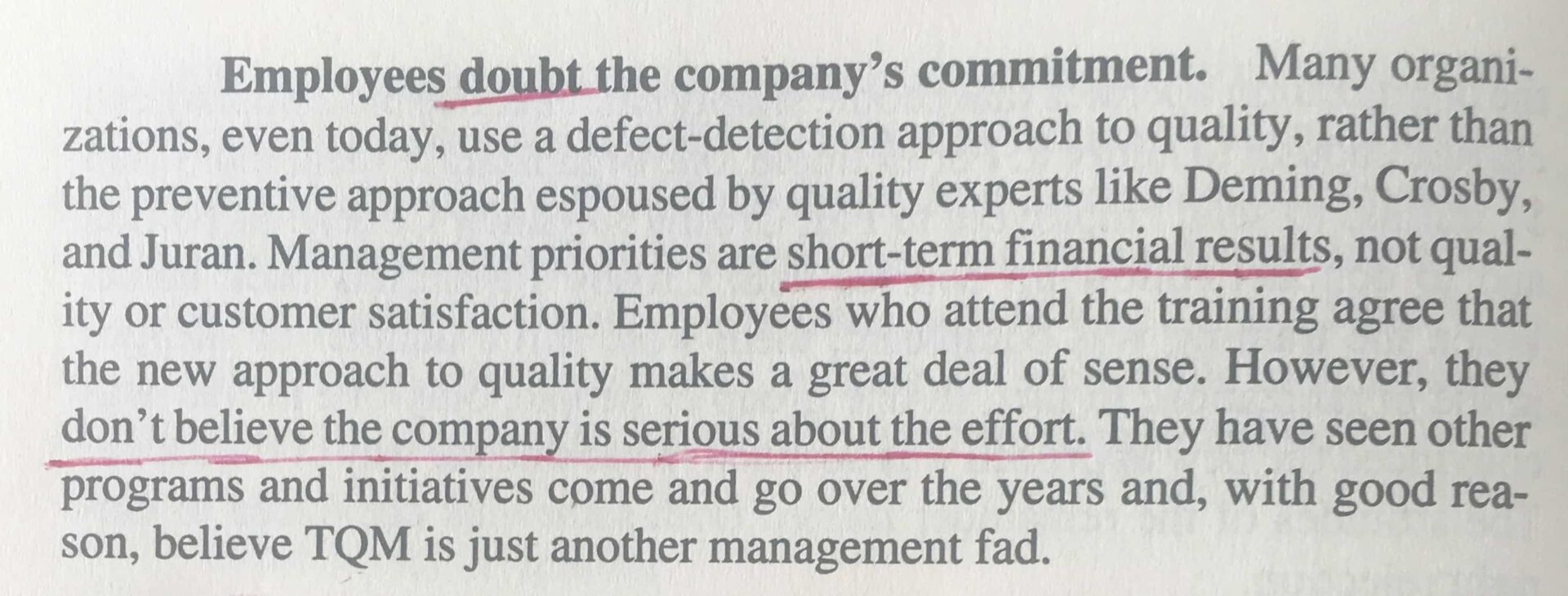
When I've worked with frontline staff on Lean and Kaizen, they often get really excited by the potential and promise of these new approaches. But, then, they usually ask something like, “How do I know this isn't just another program of the month?” or “How do we know management is serious about this?” or “Aren't they just interested in cost cutting?”

I can't tell you how many times executives have proposed that Lean is all about training or somehow fixing their frontline staff and managers. As Dr. Deming said, quality starts in the boardroom.

This is still pretty common today… an initiative gets announced without much to back it up.
How do we avoid repeating history here? Or how to reduce the number of cases that make people say that Lean has “failed?”
Note, there's already a book from 2004 on this topic: How to Prevent Lean Implementation Failures: 10 Reasons Why Failures Occur. This was a book written about manufacturing (as Lean in healthcare was still pretty new and rare)… but also relevant today? You can see the 10 reasons for failure here.
What do you think? Please scroll down (or click) to post a comment. Or please share the post with your thoughts on LinkedIn – and follow me or connect with me there.
Did you like this post? Make sure you don't miss a post or podcast — Subscribe to get notified about posts via email daily or weekly.
Check out my latest book, The Mistakes That Make Us: Cultivating a Culture of Learning and Innovation:



